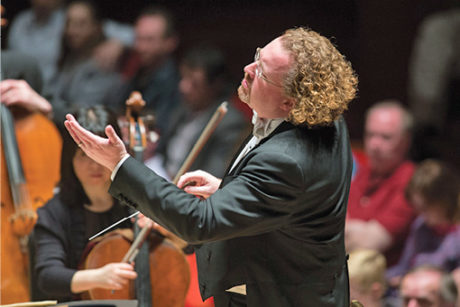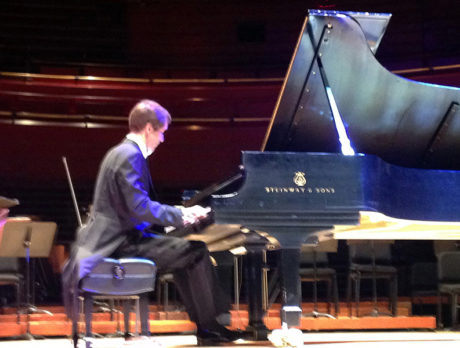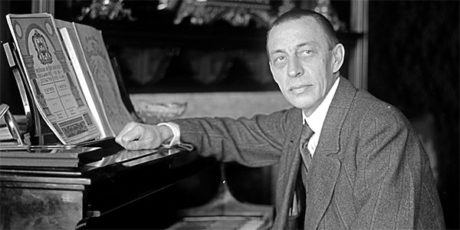During his lifetime, Sergei Rachmaninoff was more famous as a pianist than as a composer. Logically, therefore, The Philadelphia Orchestra’s current Rachmaninoff Festival is concentrating on the keyboard. The Rachmaninoff Festival includes three separate concert programs being given over three days, with short biographical plays preceding each concert and “Russian musical salons” after each concert.

All four of his piano concertos are included in the three concerts, plus his Rhapsody on a Theme of Paganini which features a solo piano. None of his symphonies are included, nor his once-very-popular orchestral The Isle of the Dead, nor his massive work for orchestra and chorus, The Bells, nor Three Russian Songs for Orchestra and Chorus which was dedicated to Leopold Stokowski.
Yet the choice is fitting because Rachmaninoff, in my parents’ generation, was thought of as a titanic solo performer who gave 70 recitals each year and was considered to be a master interpreter of Chopin’s compositions.
Three pianists dominated the opening night program… four if you count Ruth Slenczynska, now age 92, who spoke with conductor Stéphane Denève during an on-stage salon after the concert about her friendship with Rachmaninoff. During the salon, Denève sat at the keyboard with fellow-pianists Nikolai Lugansky and Haochen Zhang to perform Rachmaninoff’s youthful Romance for piano six-hands. This 1890 composition includes a melody which Rachmaninoff repeated when he wrote his Piano Concerto No. 2 in 1901.
Lugansky added the Etude-Tableau in C minor, an elegy that Rachmaninoff wrote the year he had to flee from his native Russia. This was a thoughtful choice, because the etude presaged the dark music of the Piano Concerto No. 4’s middle movement.
The opening concert on Thursday, April 27 consisted of Rachmaninoff’s Piano Concerto No. 4 with Zhang as soloist, and his Piano Concerto No. 2 with Lugansky; Denève conducted the Philadelphia Orchestra. Programs on Friday and Saturday included the other two concerti, plus the Rhapsody on a Theme of Paganini and Symphonic Dances.
The Four was written in 1926 after a 17-year hiatus in Rachmaninoff’s composing career. It’s less melodic than his earlier concerti but has witty rhythmic variety, including a jazzy pulse. Denève and Zhang took it at a faster pace than did Yannick Nézet-Séguin and Daniil Trifanov with this orchestra a year ago. The 2016 performance was more lyrical, this one more showy. The concerto starts with a sweeping theme followed later in the first movement by a lovely tune for the flute (played by Jeffrey Khaner), but the melodies sound less inspired than those from earlier in the composer’s life.
The most intriguing part of this piece is the minor-key largo of the middle movement, which descends mournfully in four steps, like a dirge for the life which Rachmaninoff lost when the 1917 Russian Revolution overthrew his beloved way of life, destroyed his family’s mansion and drove him into exile. The concerto concludes with a headlong torrent of rapid passages, with a touch of quick-step, perhaps inspired by George Gershwin’s “Fascinatin’ Rhythm.” (Rachmaninoff attended the 1924 jazz concert, sponsored by Stokowski, at which Paul Whiteman’s jazz band premiered the Rhapsody in Blue by Gershwin, and Rachmaninoff was impressed.)
Fascinating indeed. But this concerto is a triumph of craftsmanship over inspiration. Pianist Zhang is from China, a graduate of Curtis Institute, 26 years old but looks much younger. He won an ovation for his dexterity.

After intermission, Lugansky played the most famous of all Rachmaninoff pieces, the Second Concerto. Two popular song hits of the 1940s were adapted from melodies within it: “I Will Bring You Music” from the first movement and “Full Moon and Empty Arms” from the third movement. This is the music that Tom Ewell used to seduce Marilyn Monroe in The Seven Year Itch.
Lugansky’s playing was romantically dreamy, with pregnant pauses that diminished the forward thrust that’s in the composition. Denève kept the orchestra a bit reticent, favoring the soloists in both concerti. I like it better the way Rachmaninoff played, in recordings with Stokowski and Ormandy where he let the orchestra proclaim the refrains boldly, with the pianist playing the role of accompanist and elaborator. Here’s an anomaly: Rachmaninoff was a solo star yet he wrote pieces where he had the orchestra predominate.
The Russian proclaimed the Philadelphia to be his favorite orchestra. In 1909 Rachmaninoff began his first American tour as pianist and conductor with the Philadelphia Orchestra. He was at the keyboard when the Orchestra and Leopold Stokowski gave the premieres of the Piano Concerto No. 4 in 1927 and the Rhapsody on a Theme of Paganini in 1934.
As a composer, he was best-known as the writer of piano preludes, while his larger creations were greeted with reserve. When Stokowski conducted Rachmaninoff’s Piano Concerto No. 3 in 1920 the Philadelphia Evening Bulletin wrote: “The modern Russian is quite a different matter from the classic Robert Schumann and no doubt there were persons in yesterday’s audience who would have derived more real pleasure from listening to the more melodious work of the latter.”
In 1939, to mark the 30th anniversary of his first American tour, the Philadelphians and Eugene Ormandy presented a “Rachmaninoff Cycle.” Rachmaninoff played his first three concertos and the Paganini Rhapsody with Ormandy on the podium, and conducted his Third Symphony and the other pieces which I listed near the start of this report. That cycle provided a model for the current, more limited tribute.
The exploration of his art included a three-act Rachmaninoff Trilogy (one act each night, on the stage of Verizon Hall before each concert) which dramatized parts of the honoree’s life, written and directed by Didi Balle. John Hutton, a tall and somber lookalike, excelled as Rachmaninoff.

The Philadelphia Orchestra’s Rachmaninoff Festival continues through April 29, 2017 at Verizon Hall at the Kimmel Center for the Performing Arts – 300 South Broad Street, in Philadelphia, PA. For tickets, call the box office at (215) 893-1999, or purchase them online.




